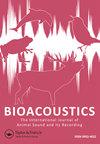朝向海岸的更高音调的鸟叫声在海洋噪音避免中起到了选择的作用
IF 2.1
4区 生物学
Q2 ZOOLOGY
Bioacoustics-The International Journal of Animal Sound and Its Recording
Pub Date : 2021-02-12
DOI:10.1080/09524622.2021.1879680
引用次数: 5
摘要
背景噪声经常阻碍鸟类的有效交流,许多研究都集中在人为噪声对雀形目鸟鸣的影响上。持续的低频自然噪声可以驱动鸟类发声的频谱和时间模式的变化,但这些影响也可能在多大程度上影响缺乏发声学习的鸟类,目前尚不清楚。我们使用自然低频噪声暴露的梯度来评估它是否对先天发声施加选择性压力。我们测试了三种斑腹鹬在暴露于海浪的连续低频噪音时是否会调整它们的歌声。我们发现,在至少两个物种中,鸟类离海岸越近,主频就会增加,这表明海浪声可能会对歌声施加选择性的压力。Tinkerbirds通过增加主频来调整它们的歌曲,以避免被环境噪声掩盖,从而改善远程通信。我们的研究提供了证据,证明自然环境噪音会影响鸟类的发声,这些鸟类的歌声是天生形成的。我们相信,我们的结果也可以在人为噪声污染的背景下进行推断,从而为研究低频环境噪声对缺乏发声学习的鸟类的影响提供了基线。本文章由计算机程序翻译,如有差异,请以英文原文为准。
Higher-pitched bird song towards the coast supports a role for selection in ocean noise avoidance
ABSTRACT Effective communication in birds is often hampered by background noise, with much research focusing on the effect of anthropogenic noise on passerine bird song. Continuous low-pitch natural noise can drive changes in both spectral and temporal patterning of bird vocalisations, but the extent to which these effects may also affect birds that lack vocal learning is not well understood. We used a gradient of exposure to natural low-frequency noise to assess whether it exerts selective pressure on innate vocalisations. We tested whether three species of Pogoniulus tinkerbirds adapt their song when exposed to continuous low-frequency noise from ocean surf. We show that dominant frequency increases the closer birds are to the coast in at least two species, indicating that ocean surf sound may apply a selective pressure on songs. Tinkerbirds adapt their songs by increasing dominant frequency to avoid masking by ambient noise, therefore improving long-range communication. Our study provides evidence that natural ambient noise affects vocalisations in birds whose songs develop innately. We believe that our results can also be extrapolated in the context of anthropogenic noise pollution, hence providing a baseline for the study of the effects of low-frequency ambient noise on birds that lack vocal learning.
求助全文
通过发布文献求助,成功后即可免费获取论文全文。
去求助
来源期刊
CiteScore
4.50
自引率
0.00%
发文量
25
审稿时长
>12 weeks
期刊介绍:
Bioacoustics primarily publishes high-quality original research papers and reviews on sound communication in birds, mammals, amphibians, reptiles, fish, insects and other invertebrates, including the following topics :
-Communication and related behaviour-
Sound production-
Hearing-
Ontogeny and learning-
Bioacoustics in taxonomy and systematics-
Impacts of noise-
Bioacoustics in environmental monitoring-
Identification techniques and applications-
Recording and analysis-
Equipment and techniques-
Ultrasound and infrasound-
Underwater sound-
Bioacoustical sound structures, patterns, variation and repertoires

 求助内容:
求助内容: 应助结果提醒方式:
应助结果提醒方式:


